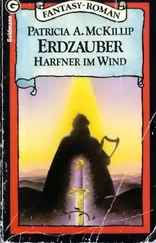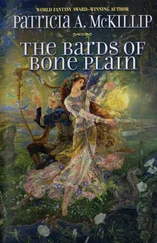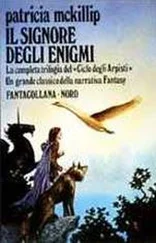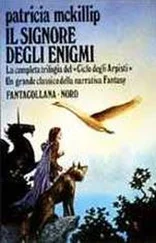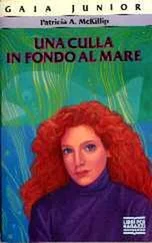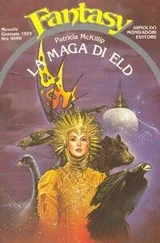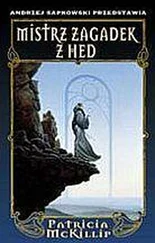Thayne, standing over its heartbeat, listened to it, until the massive, measured pound and wash of blood seemed to flow through him. His thoughts seemed enclosed by a glittering patchwork of scales. He felt again the intimation of secrets, enchantments within the room, and understood what treasure had lured the dragon to this unlikely tower.
He looked up at it, filled suddenly with the dragon’s longing. “Yes,” he said to himself and the dragon. Yes , said bone and marrow, filling with the word, in wordless dragon’s language. Yes , said the staff in his hand.
It flared suddenly; light spat out of the bole above his hand. It narrowly missed Craiche, who lost his balance anyway with surprise, and sat down abruptly on a pile of gold. Thayne heard their father shout his name. Craiche took the helm off his head and stared at Thayne.
“What is that?”
“I have no idea,” Thayne said tightly, wading through coin and armor to help his brother. “I thought it was yours. Are you hurt?”
Craiche shook his head, pulled himself up with Thayne’s hand. He bent to peer into the bole, making Thayne’s skin constrict with horror.
“Craiche—”
He straightened. “There’s something in there. A jewel or an eye.”
Thayne turned the eye toward the open gates. “Our father must have brought it down from the tower.” He added dryly, picking a sheathed sword out of the pile for Craiche to use as a crutch, “It took that for him to remember my name.”
He moved the dragon outside the yard, where it lay along the wall, its wings jutting upward like great, shining sails, its neck looped backward along its side, its heart pushed as close as it could get to the tower.
Then he sent messengers to all the North Islands, along with a single gold coin bearing Regis Aurum’s face.
By day he plotted a war, sending gold among the islanders to feed themselves, repair their houses and boats and barns for the families they would leave behind, buy arms and horses from mainland traders who asked no questions and left them alone, once they got a glimpse of the watchful dragon on Ysse. Thayne had moved the gold into the tower. At night he could wade through it and climb the stairs without a torch, it glowed so brightly; it never seemed to sleep. At night, he learned.
His father stayed with him, watched him pore over ancient books, inhaling words like air, feeling them become part of him, his bones adjusting to give them room, his heart taking a new shape. Occasionally, he struggled with the magic in the staff, trying to control its light. Sometimes it slept, deep in the dark, glittering faceted eye in the bole, no matter what Thayne did to coax it awake. Sometimes it spat its pale, dangerous fires for no apparent reason, and an ancient tome would flutter into ash, or a rock in the tower walls would crack. Once it shattered the jar his father had said was full of pearls. The smell blinded Thayne with tears, sent him stumbling with his father down the stairs. Outside, the dragon loosed a sudden snort; the stones around them trembled. For once, his father remembered his name.
“Is that the best you can do, Thayne?” he asked acridly. “Blast Regis Aurum out of Gloinmere with a stench?”
“It would work,” Thayne said inarguably, sagging against a gatepost and wiping his eyes. “They must have been very old pearls.”
When he slept, he was plagued with dreams.
Women came to him from all across the islands. They walked silently through the gates, sometimes one or two, sometimes endless numbers of them, crowding around him where he stood on the steps, watching them. Some were young and lovely, dressed in worn wool and linen, their hands and bare feet already grown broad and callused with work. Others had lined, weary faces, and children clinging to their knees. Others could barely walk; they looked at him out of eyes like cloud. No one ever spoke. They simply stood in the yard, gazing at him, until he jerked himself awake, and stared thoughtlessly into the dark. Awake, he understood their sorrow. But he could not let it touch him; even in his dreams, he refused to speak.
Finally, in his dreams, one woman spoke.
She sat in the tower with him, among the gold, holding the staff he had found. Her hair was white as bone, her eyes as black as emptiness. She turned the eye on the bole at him. He felt its light pour into him, trying to change the shape of his heart, which, he knew in the dream, was a helm made of gold, with two dark slits for eyes and a thin slash for a mouth. As relentlessly as the light melted the gold mask, he reshaped it with his own powers, showed her the expressionless, merciless face of war.
She said, “Then I will take Craiche.”
“No,” he shouted, and woke himself. It was barely light. A servant on his way to the kitchen opened the door to look at Thayne questioningly. Thayne shook his head, rubbing his face. He dropped his hands, felt the fear boring into him.
“Craiche,” he whispered. “I need you to stay here with our father. Craiche, I am tying you to this chair for a good reason; when they untie you, don’t try to follow us, the dragon will be gone. Craiche—”
Craiche eased the door open with his crutch then, startling Thayne. “I heard you shout.”
“Craiche, you are not going with us to Gloinmere. You will stay here with our father—”
“Don’t be absurd.” He backed out again, yawning, closing the door as he went. “You’re dreaming. I’m riding the dragon with you.”
“Who are you?” Thayne demanded helplessly, of the harper from Skye. “Who are you?”
But though she haunted his dreams, she did not answer.
Cyan Dag, having gone through fire and water for the lady in the tower, found himself at a loss. No embroideries fluttered across the village cobblestones to point his way. No crones with eyes as black as a raven’s shadow appeared unexpectedly to tell him where to go to find the tower with or without the lady in it. As each day passed in Stony Wood, he felt himself regain strength, but with it came a gnawing worry, a restlessness that impelled him to move without knowing where to go. The image of the dragon laden with gold, burning like the sun through the rain-lashed sky, haunted him. It would find its way to Gloinmere, he had no doubt; he had to return to warn Regis Aurum. But he could not leave Skye without knowing if the woman the king thought he had married was alive or dead. He had seen the dead turn into thread before; that he had been too distracted by dragons and selkies to rescue Gwynne of Skye from such a fate filled him with horror. He held her delicate, troubled face in his hands, still visible behind the clouds and jagged lightning bolts that warped the disk. He gazed at her intently, thoughtlessly, as if she might become aware of him, turn her eyes to him, and tell him what to do. Others had answers for him; she remained silent.
Find her , the bard had told him. Free her .
You cannot free her , the king’s snake-eyed wife had told him. You will only kill her .
She freed herself , Sel had said.
She was alive or dead, free or thread, his harrowed thoughts told him; he had to find her to know which.
Or would he find her only to cause her death?
He wanted to question Sidera, but like her sister, she seemed to vanish when he tried to find her. She was with Sel in the stone wood, Gentian told him, or with Sel among the tors, or here, just a moment ago; she would be back soon. Even Melanthos had disappeared, seduced by the magic leafing and branching out of Sel. It seemed a private matter between Sel and Sidera, and not, Cyan remembered warily, without danger. But, desperate, he found his way into it one morning, walking along the cliff to the broken tower, where he discovered Melanthos and Anyon sitting on the ring of stones, watching Sel make trees.
Читать дальше

